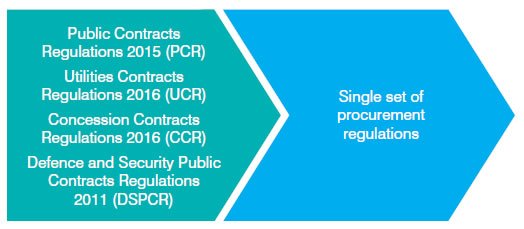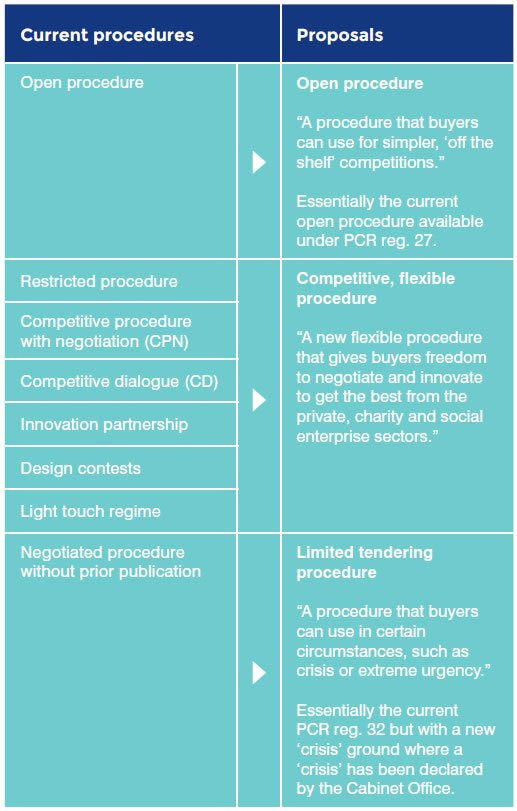The Government’s long-awaited Green Paper on Transforming Public Procurement was published on 15 December 2020. Here, Partner and Head of Infrastructure, Nicola Sumner, Legal Director, Juli Lau, Solicitor, Hannah Ismail and Trainee Solicitor, Natasha Barlow outline how the changes will affect the procurement process going forward.
The Government’s stated aim is to provide the UK with a modern, fit-for-purpose set of rules, to minimise the bureaucratic burden for contracting authorities and businesses, facilitate innovation and the participation of SMEs, and improve the process of challenging decisions in the courts.
If the proposals are implemented they’ll no doubt have a significant and long-term impact on public sector contracting.
Brexit is seen as an opportunity for the Government to reform and address the issues in our current procurement regime.
The UK has now joined the WTO Agreement on Government Procurement (GPA) in its own right which gives greater flexibility for a new procurement regime to be introduced. The impact of Covid-19 has increased the need for urgent procedures and has highlighted the sometimes overly complex nature of the current regime.
If you’re involved in public procurement in any shape or form, then we urge you to read the Green Paper in full. The consultation closed on 10 March 2021 but commentators suggested that reforms are unlikely to be in place before the end of 2021 and some have suggested not until 2022/2023.
As a quick guide, we set out some of the headlines from the Green Paper.
Contents and coverage
The Green Paper includes broad and radical reforms, covered in 8 chapters:
Chapter 1: Procurement that better meets the UK’s needs
Chapter 2: A simpler regulatory framework
Chapter 3: Using the right procurement procedures
Chapter 4: Awarding the right contract to the right supplier
Chapter 5: Using the best commercial purchasing tools
Chapter 6: Ensuring open and transparent contracting
Chapter 7: Fair and fast challenges to procurement decisions
Chapter 8: Effective contract management
New procurement principles
The first major change is the introduction of a new set of new procurement principles:
| Current procurement principles | Proposed procurement principles |
| Equality | Value for money |
| Non-discrimination | Public good |
| Transparency | Transparency |
| Proportionality | Integrity |
| Fair treatment of suppliers | |
| Non-discrimination |
The new principles are consistent with those in HM Treasury’s Managing Public Money, and so contracting authorities will be familiar with the underlying concepts. However, they are a change from the existing European Treaty principles and influence the factors that need to be taken into account when decisions are made in a procurement, potentially representing a significant change of emphasis for contracting authorities and utilities.
The other significant, overarching change proposed is the introduction of a new National Procurement Policy Statement. This hasn’t been published yet but the intention is that it will set out Government’s strategic priorities and authorities will be required to have regard to those strategic prioritises in addition to complying with new procurement principles.
New ‘one stop shop’
One of the other major headlines is the proposal to combine the existing different procurement regimes in the shape of the Public Contracts Regulations 2015 (PCR), the Utilities Contracts Regulations 2016 (UCR), the Concession Contracts Regulations 2016 (CCR) and the Defence and Security Public Contracts Regulations 2011 (DSPCR), into a single set of regulations. The Green Paper proposes that these different regimes are replaced with one new unified set of regulations with the aim to reduce complexity and improve flexibility.

The core regulations would be supplemented by unique requirements for utilities, concessions, and defence and security procurements. Interestingly, the proposals state the Government’s intention is to adopt most of the greater flexibilities in the UCR and CCR so this element, if enacted, will signal a real change in approach for many contracting authorities.
Unfortunately, the Government does not propose incorporating other procurement-related legislation into the new consolidated regime (e.g., the requirements of The Public Services (Social Value) Act 2012 are not to be incorporated) so contracting authorities will need to continue keeping abreast of more than a new single set of regulations.
Evaluation of tenders
Another proposal, although possibly not a significant change in substance, is the removal of Most Economically Advantageous Tender (MEAT) as the basis for an award decision. This will be replaced with the Most Advantageous Tender (MAT), emphasising that contracting authorities should take a broader view of what can be included in evaluation criteria assessing value for money, including social value.
New procurement procedures
Another major headline the Green Paper proposes is the replacement of the existing procurement procedures with just three procedures:

These changes are designed to remove some of the duplication that currently exists (e.g. between CPN and CD) and to enable contracting authorities to access more flexible regimes to enhance procurement and allow for greater commercial freedom. The changes may also mean, especially in the short to medium term, that procurement teams (both on the buy and supply sides) will see an increased workload while becoming familiar with the new rules and preparing new documentation. It will be interesting to see if contracting authorities use the opportunity to negotiate or if they stick with their existing, known processes, both of which are possibilities under the new competitive flexible procedure.
Exclusion grounds
As well as proposed amendments to the mandatory exclusion grounds, the Government is looking into the possibility of a centralised debarment list, which would enable the exclusion of suppliers with relevant convictions from all public procurements. This is intended to provide a quicker and more standardised approach to excluding suppliers, but we can see that this could be problematic in practice. We anticipate that overall this proposal will be met with negative feedback in the consultation response.
Procurement systems
The Green Paper outlines two new methods of procuring contracts: a new DPS+ system and an open framework. The DPS+ tool is intended to allow greater flexibility than the current DPS and Qualification Systems as new suppliers will be able to join at any time with no maximum duration and it would be available for all types of procurement.
The open framework would sit alongside the current closed frameworks and would be for up to eight years, mirroring the approach currently available to utilities under the UCR 2016, albeit with a requirement for the open framework to be opened up at pre-defined points to allow new suppliers to join. It is hoped that this will reduce the barriers for entry for small businesses by providing more opportunities to tender. However, the change does appear to signal reduced flexibility for utilities and appears to signal the end of Qualification Systems operated under the UCR 2016.
Transparency agenda and use of the Open Contracting Data Standard
The Green Paper proposes the use of the Open Contract Data Standard (OCDS) requiring the submission of procurement data to a central platform. The data would have to be published in an OCDS compliant format so that data for buyers, suppliers, contracts, spend and performance would be held and published on an open, non-proprietary, reusable basis.
OCDS would enable disclosure of data and documents at all stages of the contracting process by defining a common data model, thereby increasing contract transparency. The authorities would be required to declare in their tender documents when information would be disclosed and justify the information that is to be treated as commercially sensitive.
Remedy reforms
Another major headline and possibly the most controversial aspect of the Green Paper is contained in the sections on remedy reforms, including the proposed emphasis on pre-contractual remedies. The main elements of the proposed reforms in this area are summarised as:
- New pre-award publication obligations: proposal to require authorities to publish procurement information before proceeding to award and starting the 10-day standstill, to include: bidder identities; basis of the award decisions; and basic disclosure of tenders submitted; evaluation reports; basic evaluation disclosure information. New guidance is to be published on what would reasonably not be disclosable, but the default appears to be that authorities will need to disclose all information unless there is an exemption under FOIA.
- Removal of mandatory standstill letters: proposal to remove the current requirement to provide information on characteristics and relative advantages of the successful tenderer (although new guidance to be published may still recommend this as best practice).
- New Civil Procedural Rules and practice directions for procurement challenges: to be based on current TCC guidance and a new, tailored fast-track system, including a move to some cases being determined on written submissions only, and new rules for disclosure of documents, new rules on how to set up confidentiality rings quickly.
- The possible establishment of a new procurement-specific tribunal system.
- A proposed new test to be applied by the courts when determining whether to lift the automatic suspension based on procurement-specific measures.
- A new cap on damages that can be awarded for breaches of the procurement rules, of legal fees + 1.5x bid costs (with some exemptions, e.g. illegal direct awards or crisis procurements, where there has been a failure to publish a required notice).
The overall aim is to improve transparency and to reduce the likelihood of lengthy and expensive procurement trials. We can see that some of the proposals have merit, but we can also see that the requirement to publish information in advance of award will become a significant new burden on contracting authorities and utilities. Coupled with the new cap on damages and bespoke automatic suspension tests, this may lead to delay in getting to award.
Our teams are supporting the public sector and utilities on a whole range of procurements, including procurement projects for local and central government in the water, waste, energy, road, rail, transport, education, leisure and IT sectors. Get in touch with us if you want us to help you with a procurement project or if you want more information on the proposed public procurement reforms.

